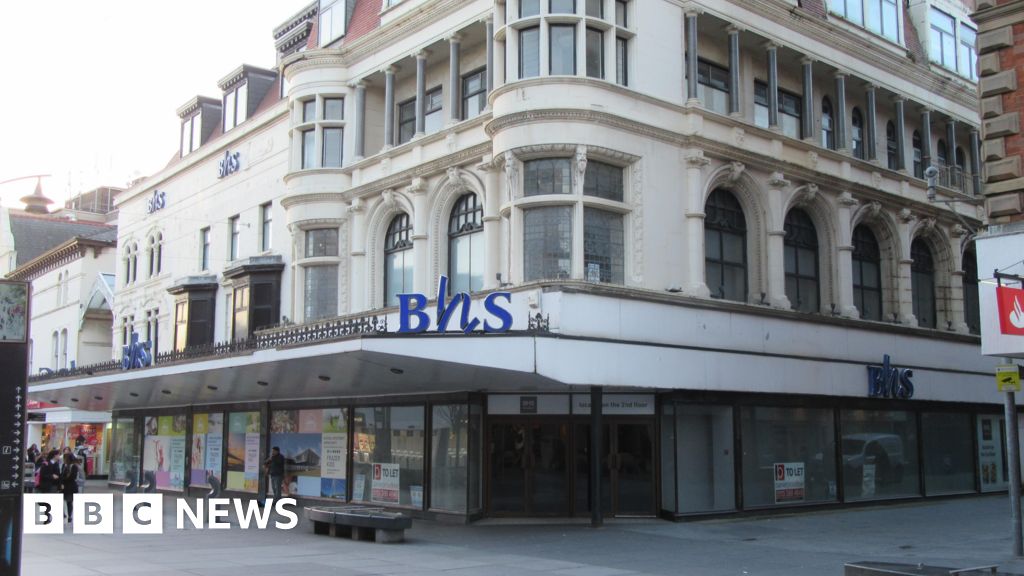Image copyright
LDC
The BHS site in Southport was in a handsome corner building – the site sold as recently as last month
A quarter of BHS stores are still vacant four years after its collapse.
The department store chain closed the last remaining stores in August 2016 ending an 88 year presence on the high street.
But finding new occupiers or uses for all the 160 sites is proving a lengthy process.
New research from the Local Data Company (LDC) shows that just under half have been re-occupied, with the rest reconfigured or demolished.
Lucy Stainton, Head of Retail and Strategic Partnerships at LDC, says the data provided a stark indication of the challenges faced when letting the largest units in retail.
“The coronavirus pandemic has considerably intensified this challenge in two key ways; the lack of demand for new units as retailers abandon plans to open new sites, and an increased supply of large units as more department stores announce closures including household names such as John Lewis and Debenhams.”
Image copyright
BBC Sport
The chart above shows the current status of the former BHS units. Sir Philip Green sold the business for £1 in 2015 and the following year it fell into administration. While nearly a third of the former units have been modified or demolished, 26% of shops are still sitting empty.
Take the seaside town of Southport. For nearly 25 years, BHS occupied a handsome three storey building on Chapel Street. It’s had a few temporary lets but no permanent demand for the space. The property was sold for £500,000 at auction last month. The buyer is understood to be local but it’s unclear what plans they might have for the site.
“Retail has to change, we haven’t got a choice. Multi-storey shops won’t exist in Southport in future,” says David Myers, who owns an opticians in the town centre.
Southport lost its other two department stores, Debenhams and Beales, this year.
“We’ve got to get this town looking right again,” he says. “The BHS building is lovely and has real potential. It needs a change of use, for instance there could be a hotel or residential on the upper floors and then split the ground floor for smaller, individual shops with realistic rents and rates.”
Like Southport, most of the BHS units were very large, with multiple floors, and costly to re-let.
Of the 91 stores which have been re-occupied, more than one fifth (20.9%) have now been taken on by Primark.
According to the data, Next has taken on four former BHS sites. B&M Bargains, H&M and Poundland have also acquired some of the space. For instance, in Southampton they spilt the store to create two units for Holland & Barrett and Sports Direct.
But finding retailers to take on a big, new space is a lot more challenging now.
Before coronavirus struck, landlords increasingly looked to leisure to help fill the gaps with venues like mini golf, rock climbing and gaming becoming more popular. But now this sector has been hit hard by the pandemic and is focussed on survival right now, rather than expansion.
Lucy Stainton says landlords are going to have to come up with some new ideas and consider changing the use of their property.
“The pandemic has already had a seismic impact on consumer behaviour including the surge in home working. As some large businesses abandon costly city centre office space, demand will increase for co-working venues as a more flexible option.
“However, this is not a silver bullet and department stores in regional towns may be less suited to this type of redevelopment, therefore we can expect to see many of these large units lying vacant for some time.”
Some sites are being completely re-purposed.
In Stevenage, there are plans for 277 new flats for the old BHS store in the town centre. In Telford, BHS has been replaced by a new indoor inflatable theme park. It was due to open in March but has been delayed because of the pandemic.
Image copyright
CDA
BHS Edinburgh used to stand here – this CGI image indicates how the 340m development may turn out
One of the biggest projects is at the huge, former BHS store on Edinburgh’s Princes Street where a £40m redevelopment is due to be completed early next year.
The upper floors have been converted to a Premier Inn hotel and the rooftop will be home to a large office and terrace. What was the lower shop is still expected to have retail but the owners recently got consent for the basement to be converted for leisure.
Steve Spray, fund manager at LaSalle Investment Management said: “This important listed building will have a new lease of life when the redevelopment is finished.
“This will help deliver the regeneration of Princes Street and considering the fate of many former BHS stores, this one should have a very positive future.”

